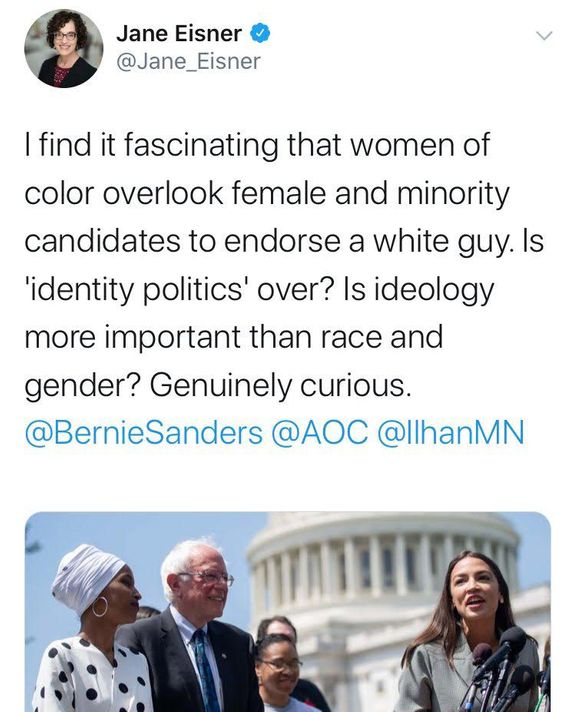
Maybe we’re being haunted for our sins. The 2016 Democratic primary ought to be over, but it looks alive, or at least undead. Occasionally it moans: Medicare for All just isn’t reasonable and heartland voters love Aetna as they would a god. It usually shows up on Twitter, where all cursed thoughts go to holler. There, it recently sensed bait. Alexandria Ocasio-Cortez, Ilhan Omar, and (probably) Rashida Tlaib have endorsed Bernie Sanders for president, and behold:
Eisner, who is the academic director of the Columbia Journalism School, appears to have deleted her tweet. But her comment still breathed new life into a familiar old phantom. In the most literal sense, Bernie Sanders is not running against Hillary Clinton this year. But the acrimony generated by their contest lingers. It is palpable in Eisner’s failure to understand why Ocasio-Cortez and Omar would endorse Sanders, a man who, since he is also old and white, superficially has little in common with them. In Eisner’s reckoning, it’s as if identity operates on a points-based system, and whoever had the most points automatically wins voters who look most like them — policies be damned.
But policy matters. It mattered in 2016, too, despite a common pretense to the contrary. There was generally a push from the Clinton camp to present their candidate as the sensible but progressive alternative to Sanders. At their most dogmatic, Clinton surrogates spoke of Sanders as if he were the antithesis to identity politics and as if support for him betrayed feminism itself. “We can tell our story of how we climbed the ladder, and a lot of you younger women think it’s done. It’s not done. There’s a special place in hell for women who don’t help each other!” Madeleine Albright said of female Sanders supporters in 2016. Stupid, but still preferable to Gloria Steinem’s apparent belief that young women picked candidates based on who they wanted to bone. “When you’re young, you’re thinking: ‘Where are the boys? The boys are with Bernie,’” she mused.
But the girls weren’t traitors, and they didn’t just want to get laid. They wanted Medicare for All. It was never that complicated. Anyone who picks their allegiances based on their community’s interests displays a form of identity politics. But on its own, the simple fact of shared identity does not an ally make. There is a vast gulf, politically, between Sarah Palin and Senator Elizabeth Warren. The gulf between the progressive Warren and a centrist like Amy Klobuchar is smaller, but real. Authentically practiced, identity politics do not mean that a person will rally around a member of their group. In 2016, many women believed their specific interests would be better served by a different theory of change. They had no time to wait on Clinton’s incrementalism, and no reason to trust her to take them where they needed to go. That’s still true now. Clinton’s centrism outlasted her political career: Its new avatars are Klobuchar and Joe Biden and Pete Buttigieg.
The perspective Eisner aired had already shown signs of unholy new life. “I actually overheard someone saying, that I thought was an interesting point, that basically at this point if you are still supporting Sanders as opposed to Warren, it’s kind of showing your sexism,” Democratic strategist Emily Tisch Sussman recently said on MSNBC. It’s not. Even if Warren is far closer to Sanders than she is to Clinton, Sanders’s supporters have substantive reasons to prefer the senator from Vermont over his friend from Massachusetts.
Applied to the congresswomen in particular, this apolitical grasp of identity is uniquely inadequate. On the stump and in comments to reporters, the two refer often to their backgrounds — to their gender, their ethnicities, their experiences with economic precariousness and, in Omar’s case, with war. Even if they wanted to forget who they are, Donald Trump wouldn’t let them. His attacks on the two congresswomen, and on their frequent allies Ayanna Pressley and Rashida Tlaib, reveal his specific antipathy for immigrants and Muslims and women. Trump doesn’t just want them to shut up, he wants them to “go back” to “the totally broken and crime infested places from which they came.” When Trump went to Minnesota for a recent rally, he didn’t just attack Omar and her politics. He attacked the state’s Somali community, to which Omar belongs, by name.
It’s a strange notion, the idea that ideology and identity sit in separate boxes to be picked up or set down as someone sees fit. But they aren’t separate, which means they aren’t opposing forces, and one is never subservient to the other. Ideology and identity are wrapped up in each other, they shape each other, and this is as true for right-wing men as it is for left-wing women.
The congresswomen have explained this in their own words, over and over and over again. In the aggregate, they have probably explained their views more often than most politicians; that is the price of being an insurgent. Americans are so unused to leftists in office that the political philosophies of both women remained topics of national debate long after they’d finished their campaigns. Anyone curious about their presidential endorsement could at least defer to their own words and deeds. Ocasio-Cortez volunteered for the Sanders campaign and describes herself as a democratic socialist, like the senator. She’s ably explained her ideology on multiple occasions. “I’m an educator, I’m an organizer, and I believe that what we’re really seeing is just a move for health care, housing, and education in the United States,” she told NBC’s Chuck Todd in a key 2018 interview. “An important part of my strategy in winning was building a broad-based coalition of people. So while there’s a focus on this one aspect of the coalition. The definition of democratic socialism to me again is the fact that in a modern, moral, and wealthy society, no American should be too poor to live.”
Omar isn’t a member of DSA, even if Trump did just call her an “America-hating socialist.” But politically she aligns herself closely with Ocasio-Cortez and Sanders, with whom she recently introduced a sweeping bill to cancel student-loan debt. She stated her rationale quite clearly on Tuesday, when she announced her endorsement. In a video released by the Sanders campaign, Omar describes the senator as “the only candidate that has built a movement and continues to build a movement that transcends gender, ethnicity, religion.”
“There was an America that I dreamed about,” she added. “There is an America that most people believe in. It is an ideal. It’s not a reality yet.” The dream is everything. That’s why she and Ocasio-Cortez endorsed Sanders. The goal isn’t a world where identity no longer matters, but one where it doesn’t hold anyone back.































